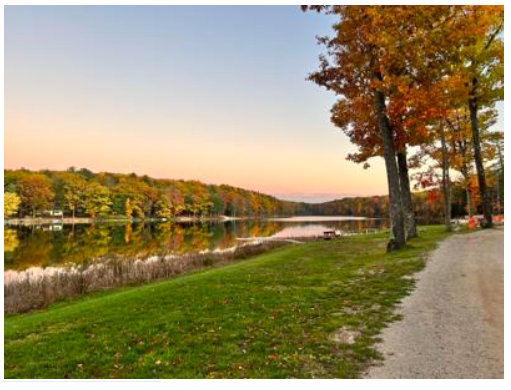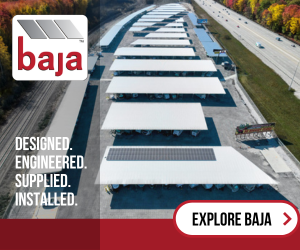Photo: Turtle Lake campground
By Erik Dick
The pandemic-influenced surge in outdoor recreation is showing signs of slowing, but if you’re looking to reserve a campground spot for your new RV over a summer holiday in northwestern Michigan, you better get to booking.
Campgrounds and Michigan’s parks and recreation division report another early year of high interest among reservation seekers as factors brought on by the global health issue persist.
The growing interest in outdoor recreation is a good reminder that business for RV and boat storage will continue booming as well, as a growing number of enthusiasts are investing in these high-priced toys. Simultaneously, more homeowner associations and cities are cracking down on vehicle storage on front lawns, driveways and streets, forcing RV and boat owners to find adequate toy storage.
People who sought socially distant outdoor recreation made an investment in and found an appreciation for not just camping but also hiking, biking and kayaking, among other similar activities. And while sellers of RVs, hiking boots and other gear aren’t seeing the record sales of 2020 and 2021, the natural beauty of the area and scores of new converts are encouraging, despite how inflation and rising interest rates are affecting consumer attitudes.
“Camping in general has really seen a resurgence of interest,” said Joe Cooper, owner of Kalkaska RV Park and Campground.
The great interest in the great outdoors
That camping as an outdoor getaway experienced a surge in interest amid the pandemic isn’t surprising. People who were told to keep their distance from others were looking for some recreational outlet. Gyms were closed. Restaurants were closed. Flights and their distant destinations raised worries of health risks.
A campground in many ways was a COVID oasis, a welcome reprieve from the staid confines of our homes and the outsized attention we focused on our cellphones and television screens and their continual updates of an uncertain future.
“2020 was really off the charts,” Cooper said. “2021 was much the same. Just people looking for any way to get out and about and do something besides sit at home, especially little children.”
What is perhaps less apparent is how the pandemic continues to fuel camping’s popularity despite the restaurants and movie theaters and trips to the Caribbean being back on. The rise of remote work, for instance, allowed people to work from nearly anywhere, including a campground. Supply chain troubles helped spur high inflation, which has made a weekend of camping a particularly economical vacation for many people.
State park camping reservations for this year reached 688,489 as of Feb. 28, down 2% from the same period the prior fiscal year and 0.5% lower than fiscal year 2021, according to Michigan DNR’s parks and recreation division. But early reservations are still up 28-36% from the three fiscal years prior to 2021.
Ron Olson, chief of the parks and recreation division, said state park staff have seen a number of new people who tried camping, liked it and want to come back. He said the parks division is looking for summer workers to help accommodate the visitors.
Terry Blalock, manager of Turtle Lake Campground in Beulah, said he also saw a lot of first-time campers in recent years. He also saw what he called “COVID trailers” — camping trailers built by manufacturers amid the pandemic that later required repairs.
The summer holidays are booking fast, he said. The park’s equestrian campground also is experiencing increased business.
Count equestrian among the outdoor activities that has seen a statewide increase. Dollars spent on equestrian rose 10% from 2019-2021, according to the most recent federal Bureau of Economic Analysis data available. Bicycling was up 34%, climbing, hiking and tent camping was up 39% and RVing was up 42%.
With new gear in hand, however, many outdoor enthusiasts may be set for the coming year, so while campgrounds, parks and trail systems may see as many visitors as in recent years, expectations among outdoor recreation retailers is more subdued.
The shifting supply chain
Perhaps no gauge better illustrates the subsiding crest of the pandemic-influenced outdoor recreation business than the RV industry.
Elkhart, Indiana-based RV manufacturer Thor Industries in March reported a 39% decrease in second-quarter net sales from the same period a year ago. Looking ahead, higher interest rates, elevated prices and full dealer inventories will play a role in 2023, the company said in a news release.
RV manufacturers scaled back shipments nearly 54% in February compared with the record amount shipped the same period a year ago, according to the RV Industry Association.
Cliff Galer, general manager of Petoskey RV USA, said rising interest rates could curb sales to people interested in the RV camping lifestyle, “but I still see a lot of people getting into it that have never done it,” he said.
Kyle Lawrason, a sales representative at Brick Wheels in Traverse City, says the bike business has been similar. Early in the pandemic, heightened demand collided with supply chain shortages, he said, noting the particular interest in low-step electric bikes.
“We were selling a ton of those, and it was really hard to keep those in stock,” he said.
Brick Wheels experienced some record months during the pandemic, he said, as store managers brought on new bike brands to help meet demand.
He expects a sales dip this year, but seasonal resident retirees should continue to help drive good traffic.
Eventually, he said, a sales downturn will occur until repeat customers begin looking for replacements or upgrades. ““But I don’t foresee that driving, continuing to drive the sales through the roof like they are right now,” he said.
Now is a good time to shop, he said. “We’ve got probably the most inventory I’ve seen in eight years,” he said.
Indeed, in some sectors, the supply chain situation has swung the other way. A sudden increase in available products paired with a decline in consumer spending has led to widespread overstocking, according to a 2023 sporting goods industry report by global business consultant McKinsey & Co.
Consumers are likely to spend less on sporting goods this year, the report said. More than half of consumers surveyed said they will buy fewer items, while about 20 percent said they would buy less expensive brands.
Tracy Mayer, president of outdoor gear retailer Backcountry North in Traverse City, said she is pleased that some of the supply chain struggles are a thing of the past. She has recreational sea kayaks and other items in stock again.
“So we should be able to fulfill our customer’s desires with, you know, what they want rather than, well, here’s a paddle that will work for you,” she said.
She said the draw of northern Michigan’s outdoors keeps the business stable, even when the economy prompts people to be a little more frugal. “We’ve seen these cycles before,” she said.
The wide gamut of recreational opportunity
Crystal Mountain in Thompsonville is no stranger to making the most of outdoor activities. What began as a ski hill in 1960 is now a year-round resort with, among other things, zip lines and outdoor laser tag.
Downhill ski, cross-country ski, snowshoe, ice skate or ride fat-tire bikes among other activities in the winter. Golf, ride the alpine slide, play in the waterpark, wall climb or play disc golf among other offerings in the summer.
Public relations manager Brittney Buti Primeau said the resort, too, has seen an uptick in interest amid the pandemic years as people try new things or return to sports such as skiing that they once loved. This winter brought a lot of interest in skiing and snowboarding lessons, she said.
Last year, she said, marked the resort’s inaugural Total Archery Challenge, where participants competed on archery courses throughout the resort and also tested out new gear. The resort expects nearly 2,500 participants at this year’s event, June 9-11.
“It was a new crowd that we were happy to welcome and welcome back this year,” she said.
Erik Dick wrote this special report for the Record-Eagle.































